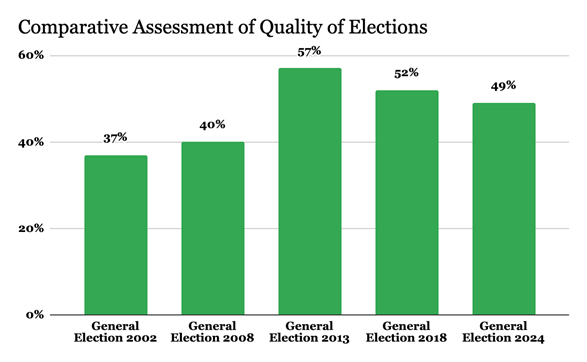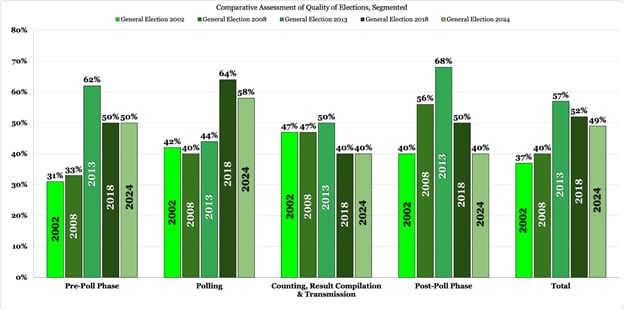2024 elections rank lowest on fairness score since 2013: Pildat
Report demands formation of inquiry commission to probe irregularities, widespread allegations
The Pakistan Institute of Legislative Development and Transparency (Pildat) on Wednesday released an assessment report on the February 8 elections, concluding that the 2024 general elections recorded the lowest fairness score since 2103 due to irregularities and widespread rigging allegations.
The Pildat, a leading non-governmental election watchdog, has highlighted a concerning decline in fairness scores in the February 8 polls compared to previous election cycles.
It said the overall fairness of the 2024 elections in Pakistan received a score of 49% which is three percentage points lower than the score received for the 2018 General Election, as per the report.
Fairness assessment scores for the 2013 and 2018 elections stood at 57% and 52%, respectively.
Overall, these scores, particularly the steady decline in them since 2013, are emblematic of the weakening of the democratic processes in Pakistan and they underscore the urgent need to restore public confidence in the electoral system, the election watchdog said.
The Pildat also recommended enhancing transparency and accountability measures throughout the electoral process, calling on the Election Commission of Pakistan (ECP) to conduct a thorough investigation into the delays and deficiencies observed during the elections, particularly in result compilation, transmission, and consolidation.
Despite advancements, the pre-poll phase has stalled at a 50% fairness score since 2018, indicating persistent pre-election issues.
The report said polling day’s voting process score dipped to 58% in 2024 from 64% in 2018, yet showed a rise from 44% in 2013, reflecting fluctuating levels of voter experience.
Moreover, it said no progress in result management since 2018 with the score stuck at 40% highlighting a critical need for an inquiry into Election Management System (EMS) operation.
The post-poll satisfaction hit a historic low matching the 2002 score of 40% pointing to increasing public distrust in electoral outcomes, said the Pildat report.
Quality of general election
The report also highlighted the considerable delays in scheduling of the election, political repression, lack of impartiality from caretaker governments and state institutions, and worsening law and order in Khyber Pakhtunkhwa and Balochistan during the pre-poll phase.
On polling day, the suspension of mobile phone and internet services not only compromised the EMS but also created problems for public participation in the electoral process, it said.
After polling was completed, the delay in the announcement of the provisional results beyond the deadline fixed in Section 13(3) of the Elections Act, 2017, prompted serious questions about the credibility of the election.
The election watchdog also noted that widespread allegations of discrepancy between Forms-45 and Form-47 have also added to the concerns about the credibility of the election.
"The delay in the publishing of Forms 45, 46, 48 and 49 on the ECP website – a violation of Section 95 (10) of Elections Act, 2017 – has further damaged the credibility of the election."
Pildat's recommendations
The Pildat recommended the ECP to conduct a thorough and impartial investigation into the delays in the transmission, consolidation, and announcement of provisional results.
Moreover, the ECP was also urged to probe the lack of contingency planning to meet result issuance deadlines in case of the EMS inoperability and the failure to publish signed copies of Forms 45, 46, 48, and 49 within 14 days of polling day as required under the Elections Act, 2017.
"We also recommend that, in order to bring the controversies relating to GE2024 to a close, a clear path be decided for the way forward. There are only two possible avenues to consider.
The election watchdog demanded that the number of election tribunals be adequately increased to decide all election petitions within the legal deadline of 180 days to avoid inordinate delay.
In addition to the election tribunals, the Pildat also called for constituting a commission of inquiry like the one formed to probe the 2013 general election.
"The incoming National Assembly and the Senate should deliberate and decide whether a Commission of Enquiry be constituted to ensure accountability, transparency and political stability."
-
Security forces gun down 30 terrorists in multiple IBOs in KP: ISPR
-
MQM-P calls for new province in Sindh
-
US report validates Pakistan military edge over India: PM
-
Banned TTP poses serious threat to Pakistan security: UNSC panel
-
CM Afridi clarifies remarks on by-poll after ECP requests army deployment
-
Dubai sees 3.2m Pakistani passengers in 2025 as airport sets new milestone
-
Security forces kill 23 Indian proxy terrorists in KP's Kurram
-
Pakistan to construct island to boost oil exploration: report














